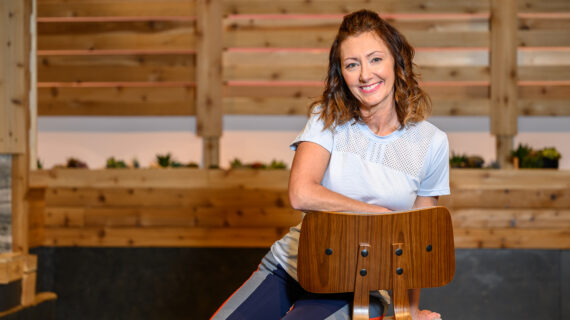Announcer:
The following program is a PBS Wisconsin original production.
Frederica Freyberg:
Holes in state and federal legislation allow domestic violence abusers to access firearms and a bipartisan push and pull ends in a deal to fund improvements to the Brewers stadium.
I’m Frederica Freyberg. Tonight on “Here & Now,” Congresswoman Gwen Moore on the lethal connection between domestic violence and guns. Then, we continue reporting on Wisconsin families with close connections to the war in Gaza. The Senate minority leader discusses getting the Brewers’ stadium funding to home plate. And the last in our series, “Wisconsin in Black and White.” It’s “Here & Now” for November 17.
Announcer:
Funding for “Here & Now” is provided by the Focus Fund for Journalism and Friends of PBS Wisconsin.
Frederica Freyberg:
This week, Wisconsin Attorney General Josh Kaul announced he is going after a loophole in state law that allows people convicted of disorderly conduct involving domestic violence to possess a firearm.
Josh Kaul:
The data is clear that when domestic violence and access to firearms are linked, the dangerousness of the situation increases dramatically. In some instances, access to a firearm can make a difference between whether a domestic violence case results in somebody’s death or not.
Frederica Freyberg:
Meanwhile, the U.S. Supreme Court is now considering the case of a Texas man who argued his Second Amendment rights were violated because a 1994 federal law prohibited him from having a gun as the subject of a domestic violence restraining order. As the court was poised to hear the case, Wisconsin U.S. Representative Gwen Moore introduced a resolution in Congress calling attention to the, “relationships between firearm violence, misogyny and violence against women” and re-affirming the importance of preventing people with a history of domestic violence against women from accessing guns. Representative Moore joins us from Washington. Congresswoman Moore, thanks very much for joining us.
Gwen Moore:
Oh. It is so wonderful always to be with you, Frederica.
Frederica Freyberg:
So your resolution says legislation is needed to prevent individuals with a history of violence against women from purchasing or possessing a firearm.
Gwen Moore:
Well, we are seeing right now in the Supreme Court a decision that was made at the lower court. So we’re not going to wait a year from now to see what the court does. We’re trying to be really preemptive now so that there won’t be any gap in support or services. I mean, for 20 years or more, it’s sort of been the law of the land that if people go out and get restraining orders, if there’s been a history of violence and domestic violence, that you really don’t have to wait until someone actually pulls the trigger, and we see that, you know, firearms is the, you know, 88%, almost 90% of the cause of death in the domestic violence situation, that those interventions can be made, because we absolutely don’t want there to be any lapse in the ability for the court to deny, you know, a gun to a known batterer, and so we think that this — this circuit court decision could create a lot of confusion and really put women’s lives at risk. So we don’t think there was any time to waste.
Frederica Freyberg:
So this is personal for you and you expressed that in introducing your resolution. What happened that drives you?
Gwen Moore:
Well, Frederica, you know, I’m 72 years old, so I’ve been around a long time. And, you know, when I was in my early 20s, long before there was the Violence Against Women Act, long before there were any hot lines to call or anything, a then boyfriend pulled a gun out to my head because, you know, I, you know, was too sassy or whatever, and threatened to shoot me and I, being very foolish, you know, told him, just go on and shoot it or eat it, you know, and so he just said I was crazy, which I probably was because he could have shot and killed me. But I guess I’m grateful that he didn’t, but, you know, we should not have to depend on luck, because there are too many women who are not lucky. There was a report done by End Abuse Wisconsin that I found very, very distressing, to be frank with you. We had seen a decline in domestic abuse, thanks to the work of a lot of agencies all around the country, but in the last — last years, there’s been a huge uptick and in 2021, 2022, we saw a huge uptick in domestic violence, and particularly with the use of guns in Wisconsin. We’ve seen — this has a disparate impact in minority communities but with regard to the split between urban and rural communities, it’s just about half-and-half. So it’s not just an urban problem; it’s a rural problem, and, of course, the victims disproportionately seem to be women. So, you know, we can’t pretend that it’s not a social problem that women, children, other family members, that are nearby aren’t affected by this scourge and there’s, like I said, there’s been a huge uptick in the last couple of years.
Frederica Freyberg:
Those are extremely alarming statistics, as you point out. Why is it so difficult, though, to kind of translate those statistics into meaningful protective policy?
Gwen Moore:
Well, Frederica, quite frankly, I think that people have elevated, you know, the quote/unquote Second Amendment, you know, above and beyond our value for life, by far. These homicides occur because there’s an available firearm.
Frederica Freyberg:
What is the connection between misogyny, violence against women, and firearm violence, even the increase in mass shootings?
Gwen Moore:
Let me take that last part first. It was stunning to me to learn that many of the mass shootings that we see are people who had prior behavior as domestic abusers. So, you know, surprise, surprise. Here’s a mass killer, but they had been people who had been engaged in domestic violence before the act of being a mass killer, so there’s very clearly a connection. And, of course, misogyny, one of the things that occurred during COVID, when we had all of these commercials saying “you’re safer at home,” is when we started seeing really a huge uptick in domestic violence, and I really had to come out and say, “My God, there are so many people who are not safer at home.” But I think what really contributes to the domestic violence is the presence of a gun.
Frederica Freyberg:
Congresswoman Gwen Moore, we leave it there. Thanks very much.
Gwen Moore:
Thank you. Be well.
Frederica Freyberg:
Turning to international news, it’s now more than five weeks since the Hamas terrorist attack on Israel. With the death toll in Gaza topping 11,000 and growing. “Here & Now” reporter Aditi Debnath continues that reporting on how the escalating war continues to torment these Wisconsin families.
Betsy Forester:
There are no positive ways to spin what is happening.
Hama:
I just want this thing to end.
Aditi Debnath:
These Wisconsinites have close connections to the war. Like Hama, a native of Gaza, whose family there does not have internet access to tell her if they’re alive. For now, pictures of her family are all she and her mother have.
Hama:
She just have our house photos and the crying. That’s the only thing she’s doing right now.
Aditi Debnath:
Hama recently applied for U.S. citizenship and fears anti-Palestinian backlash if she speaks to the media. She also worries that her family in Gaza may be targeted.
Hama:
I have zero hope to see them again.
Aditi Debnath:
This war is an episode in a decades-long conflict. She feared for her family in 2014 also.
Hama:
That war, I lost my aunt family, like eight people died, killed in that one.
Betsy Forester:
Who live under the constant threat of missile attacks and death.
Aditi Debnath:
The fate of all people in Gaza and Israel leads Rabbi Betsy Forester to pray for them multiple times a day.
Betsy Forester:
To hold it together I believe is what my job is.
Aditi Debnath:
But it was harder for her to hold it together when her husband, Scott, was in Israel with their daughter, and Israel declared war.
Betsy Forester:
I felt very helpless here.
Aditi Debnath:
Scott is back home now but still unsettled.
Scott Forester:
Everybody is walking around with a cloud hanging, you know, a cloud of uncertainty.
Aditi Debnath:
Following Hamas’ attack killing an estimated 1,200 Israelis, the unrelenting retaliation by Israel has so far killed more than 11,000 people in the Gaza strip, and that number continues to grow daily. UW-Madison Professor Samer Alatout is a native of Palestine and a geopolitical expert of the region. He says at issue is Zionism, the movement to establish a Jewish nation on Palestinian land.
Samer Alatout:
The people who paid the price for the Zionist project are the Palestinians, and they paid a heavy price.
Aditi Debnath:
That heavy price is what Amnesty International deems apartheid. Decades of Israeli laws and policies designed to, “maintain a cruel system of control over Palestinians.” Even in Israel, most citizens don’t support the government’s leaders according to a study by the Pew Research Center.
Marc Kornblatt:
So it’s a really, really tough time to be an Israeli.
Aditi Debnath:
Marc Kornblatt lived in Madison for more than 30 years before he and his wife moved to Israel in 2019. Now in Tel Aviv, he says most Israelis do support Palestinian liberation.
Marc Kornblatt:
I’ve not become more Zionistic. I’ve not become more right wing. I’ve not become more religious. I’ve become more Jewish.
Aditi Debnath:
Kornblatt says it’s important to show his community that they’re not alone. He volunteers at a clothing donation center and participates in a citizen patrol.
Marc Kornblatt:
I would rather have the vital life that I have here where I might make a small difference, than the quiet life that I could choose by leaving.
Aditi Debnath:
Kornblatt says the Jewish community is a small one. .2% of the world population, according to Pew, and many of his neighbors know someone who has been tortured or killed in this war.
Marc Kornblatt:
One of the big calls that comes out to the place where I’ve been working with the donated clothes in our neighborhood is for social workers. Just to be able to sit with people and let them try and breathe and talk.
Aditi Debnath:
Over in Gaza, a Wisconsin man’s sister was killed in a bombardment while at a marketplace there soon after the October 7th attack. She was a Palestinian social worker and her brother, Mohammed Hamad, lives in Brookfield.
Mohammed Hamad:
And she worked for, I don’t know, all her life to treat her kids. They are going through trauma and to help them, you know, to recover after wars.
Aditi Debnath:
Hamad says he’s lived through numerous wars and hopes for an immediate ceasefire. Betsy Forester says the current war is only setting Palestinian liberation back.
Betsy Forester:
Large swaths of the Israeli population and the American Jewish population have been working hard for a two-state solution and an end to the occupation of the West Bank.
Aditi Debnath:
Professor Alatout believes in one state, from the Jordan River to the Mediterranean Sea that equally includes Palestinians and Israelis.
Samer Alatout:
The solution is one democratic state between the river and the sea with a state of its citizens and for its citizens and with equal rights to everybody.
Aditi Debnath:
No matter the solution, Hamad said there’s only one way out of this war.
Mohammed Hamad:
There will be end for this cycle of violence by agreement, by people who know they’re going to live side by side in peaceful situation.
Aditi Debnath:
Until then, the cloud of uncertainty and the fear of death remains for these Wisconsin families and hangs heavy. For “Here & Now,” I’m Aditi Debnath.
Frederica Freyberg:
Governor Tony Evers is expected to sign the new Brewers stadium funding package, keeping the team in Milwaukee until 2050, or another 27 years. The slim-downed state contribution of an estimated nearly $366 million with the help of ticket surcharges helped push bipartisan approval of the plan. Still, there was also bipartisan opposition to signing on to such public funding of a major league ballpark. Senate Minority Leader Melissa Agard helped negotiate the terms. She joins us now. Thanks very much for being here.
Melissa Agard:
Thank you.
Frederica Freyberg:
So why is it important to you to keep the Milwaukee Brewers in Milwaukee?
Melissa Agard:
Well, it’s important to me that the Milwaukee Brewers are here in Wisconsin and in Milwaukee. They’re part of our culture and as a state that is suffering from an awful lot of out migration of our young people, to me, it is vitally important that we think about the impacts of our culture leaving our state. Making sure that the Brewers stay here in Wisconsin, not only is good for the talking points and, you know, the vision of what Wisconsin is going to look like, but we also know that it’s good-paying jobs for the people that work at the stadium, that it provides additional revenue to counties around the state of Wisconsin because we were able to negotiate a decrease in sales tax fees that the state will collect from those communities, that we know that there are good jobs that will go into the renovations that need to happen at the stadium. Ultimately, it hits a lot of marks on how it is that Wisconsin will benefit from keeping the Brewers here.
Frederica Freyberg:
Was the threat of them leaving real?
Melissa Agard:
Absolutely, yes. It was made very clear to me that the Brewers had received multiple offers from other teams across the nation — or other cities across the nation and that, in January, they were going to be taking very seriously communicating with those locations.
Frederica Freyberg:
Would you have voted for it or urged your members to if in the end the bill did not reduce the state’s financial contribution?
Melissa Agard:
I believe that good work was done early on by Governor Tony Evers and my colleagues in the Assembly to get the bill to a better place than when it was first introduced, but I also was very confident that I was able to bring the voices of my colleagues and the constituents who we represent to the table in the Senate and make it even better, so I’m glad I didn’t have to make that decision. We were able to get the sales or the state revenue numbers down for the investment and also negotiate a seat at the table for the locals, the county and the city, and that was very important to me and my caucus as well.
Frederica Freyberg:
Why? Tell me about the importance of that.
Melissa Agard:
There’s an old saying. If you’re not at the table, you’re on the table, and knowing that the city of Milwaukee and the county of Milwaukee are two partners in delivering funds to keep the Brewers here in the state of Wisconsin, I think it’s vitally important that they also are sitting at the table in part of the negotiations.
Frederica Freyberg:
Still, as we mentioned, there was opposition to this from those saying that it’s a windfall for the Brewers, too much public funding for a profitable sports team. What’s your response to those concerns and criticisms?
Melissa Agard:
Certainly that is a moral issue nationwide when it comes to professional sports teams, but this is the trend and, you know, we can have those conversations and work with our professional sports teams and their associations to change that dynamic. But right now, if we want to keep the Brewers in Wisconsin, there had to be a state contribution. We do have a $7 billion surplus, and frankly, I would have preferred that we had gone down the path that was proposed by Governor Evers but the Republicans in the legislature didn’t like that. We were able to bring down contributions by tax dollars and take some of that pressure off, add more voice to the table for our local governments and also negotiate benefits for our counties across the state of Wisconsin through this deal. Is it exactly perfect? No. But I think it’s very important that we keep the Brewers here in the state of Wisconsin and I’m glad we were able to get there.
Frederica Freyberg:
What about other priorities of yours that could use an infusion of cash, particularly as we speak about that surplus, those that you’ve enumerated include education, the UW, increasing wages and childcare funding. This Brewers package was such a big deal and a lot of state money went toward it. What about those other priorities of yours?
Melissa Agard:
So, absolutely. We know that in the legislature, we can walk and chew gum at the same time, that we can work hard on multiple different policies: protecting our air and water, addressing PFAS contamination, addressing our childcare crisis here in the state of Wisconsin, funding our schools at all levels, whether it’s our K-12 schools, our university systems, unsticking the block that is preventing workers at our university systems from receiving the wages that they were promised through our budget. These are all priorities of Democrats in the legislature and we’re going to continue pushing for them but at the same time, we had another conversation that needed to happen and that was in regards to the Brewers.
Frederica Freyberg:
Just very briefly, with less than half a minute left, there was bipartisan negotiation here. Do you think that bodes well going forward?
Melissa Agard:
We’ve had bipartisan negotiations on a number of big bills this session, and I do maintain hope. That’s what people in Wisconsin want. They want us to work with each other.
Frederica Freyberg:
All right. Senator Agard, thanks very much.
Melissa Agard:
Thank you.
Frederica Freyberg:
We turn now to our series of special reports on race, with “Wisconsin in Black and White, ” in partnership with the Nehemiah Center for Urban Leadership Development. Last week, reporter Nathan Denzin brought us the story of one man’s health journey as he works to improve outcomes for all Black men. Tonight we take a look at generational trauma and its impact on mental health. Here’s the final installment of “Wisconsin in Black and White: Health Divides. ”
Everett Mitchell:
If I’m talking about it and I’m not embarrassed about it, then you don’t have to be embarrassed either. The mental health of so many people, you know, myself included, are just being, I mean, it feels like you’re just being constantly attacked.
Nathan Denzin:
Reverend Everett Mitchell is a pastor at Christ the Solid Rock Baptist Church in Madison, and also a Dane County judge.
Everett Mitchell:
I don’t know what it is, but people are feeling darker now.
Jasmine Zapata:
Mental health is so, so extremely important, especially in the aftermath of COVID.
Nathan Denzin:
Dr. Jasmine Zapata is the chief medical officer for community health at the Wisconsin Department of Health Services.
Jasmine Zapata:
Younger people, and in particular our Black youth, where we see increases in overdoses, mental health concerns, adverse childhood experiences.
Everett Mitchell:
I grew up, there was a lot of trauma, but nobody talked about it. There was a lot of pain; nobody expressed it. We saw cycles of people, you know, alcoholism and drug abuse, just kind of going through the same cycles.
Nathan Denzin:
Repeating cycles in families that go way back. For Lilada Gee, many of the mental health issues facing the Black community today can be attributed to the generational trauma they hold.
Lilada Gee:
I think there is not a Black American that is not touched by generational trauma.
Nathan Denzin:
Gee is the founder of Defending Black Girlhood, a nonprofit that works with Black girls and women to unpack and heal their trauma. As part of that work, she creates art depicting resiliency. She is also a lecturer at the Madison-based Nehemiah’s Justified Anger: Black History for a New Day course. The nine-week course teaches the community about race, history, and justice.
Lilada Gee:
In the way I would define, it is something that has happened to an ancestor that was so devastating that the impact reverberates to today.
Nathan Denzin:
Even if you aren’t aware of the trauma you carry, Reggie Jackson says it can affect your life.
Reggie Jackson:
It teaches you to see yourself in a very specific way. It teaches you that somehow, you can’t think of yourself in a positive way.
Nathan Denzin:
Jackson is a community leader in Milwaukee.
Reggie Jackson:
You are going to be told by society, generation after generation, even after slavery ends, that you are an inferior species, that you are not deserving of being treated as a first-class citizen in America.
Lilada Gee:
If you don’t have the experience to be able to heal, then that trauma remains there.
Reggie Jackson:
It passes down in terms of the way that you interact with your family members, your children, your grandchildren, your great-grandchildren. All of those things are impacted by the people that came before you.
Nathan Denzin:
Generations of people being treated as second-class citizens often expressed by what are known as microaggressions.
Lilada Gee:
Microaggressions from my definition, are these small, insidious experiences that happen on a regular basis.
Nathan Denzin:
Some are small and insidious; others are overt, and they can happen in every facet of life, like trying to schedule appointments.
Lilada Gee:
The lady I’m talking to, she puts her hand over the phone and says to somebody in the background, “I don’t mean to be racist, but I think I’m talking to an angry Black woman here. ”
Everett Mitchell:
We thank you, God, for all these blessings
Nathan Denzin:
At Christ the Solid Rock, Mitchell says the trauma his parishioners carry is always on his mind.
Everett Mitchell:
I prioritize not only education about the faith, but also your mental health, mental well-being as a spiritual priority.
Nathan Denzin:
While church attendance is declining, nearly 70% of Black Americans still go to church at least once a month.
Everett Mitchell:
The Black church is essential because it speaks to the issues that people experience.
Nathan Denzin:
The Black church has been part of American life before America was even founded. The first Black church was founded in 1773 during slavery.
Everett Mitchell:
In many ways, the Black church is a response to the, you know, the brutality of slavery in our American history.
Nathan Denzin:
Mitchell says the Black church differs from most white churches because they often talk about religious practicality.
Everett Mitchell:
What you experience on the outside of the world should be brought in here so we can better understand how we deal with it, how we talk about it.
Nathan Denzin:
To help his congregation through the trauma they may have, Mitchell gives a five-week sermon every year to help define and heal from trauma and resulting problems with mental health.
Everett Mitchell:
You don’t have to pray it away. It is something we identify and we live with, and it’s the living with it that gives us the courage to be able to transform it into something that can be useful for us and for our families that we serve.
Nathan Denzin:
He says the sermons have had a tremendous impact on his congregation.
Everett Mitchell:
But it’s something within us. That in and of itself has given people permission to move in and out of the space of trauma without thinking that this is something that they need to get rid of or that one sermon or one prayer is going to just release it.
Nathan Denzin:
For Lilada Gee, the most important healing work is with Black women.
Lilada Gee:
It’s hard for the Black community to move forward if Black women are not healed, and if Black women are not healed, then they continue to pass that pain on to generation to generation.
Nathan Denzin:
But she says that healing is possible if you’re willing to put in the work and lean into joy.
Lilada Gee:
Joy is something that you feel, you just get to feel when you lean in, and comes from gratitude, and it comes from hope and the belief that your life can be better.
Everett Mitchell:
Our messages have to become brighter, and the only way that we can do that is to give people a demonstrated experience in our local community to offset all of the crazy stuff that they’re hearing about.
Lilada Gee:
The trauma that we’ve experienced is not something we have to carry for a lifetime.
Nathan Denzin:
For “Here & Now, ” Im Nathan Denzin.
Frederica Freyberg:
For more on this and other issues facing Wisconsin, visit our website at PBSwisconsin.org and then click on the news tab. That’s our program for tonight. I’m Frederica Freyberg. Have a good weekend.
Announcer:
Funding for “Here & Now” is provided by the Focus Fund for Journalism and Friends of PBS Wisconsin.
Search Episodes
Related Stories from PBS Wisconsin's Blog

Donate to sign up. Activate and sign in to Passport. It's that easy to help PBS Wisconsin serve your community through media that educates, inspires, and entertains.
Make your membership gift today
Only for new users: Activate Passport using your code or email address
Already a member?
Look up my account
Need some help? Go to FAQ or visit PBS Passport Help
Need help accessing PBS Wisconsin anywhere?

Online Access | Platform & Device Access | Cable or Satellite Access | Over-The-Air Access
Visit Access Guide
Need help accessing PBS Wisconsin anywhere?

Visit Our
Live TV Access Guide
Online AccessPlatform & Device Access
Cable or Satellite Access
Over-The-Air Access
Visit Access Guide
 Passport
Passport


















Follow Us